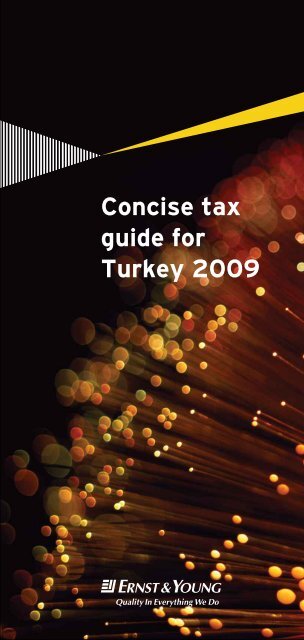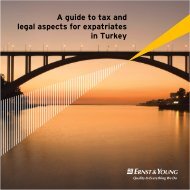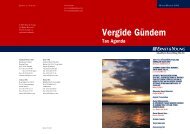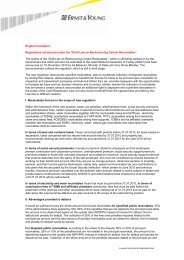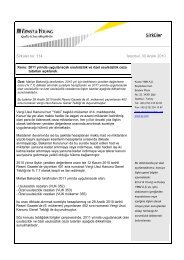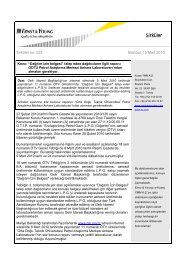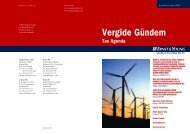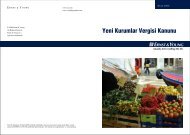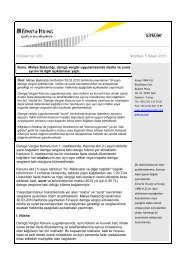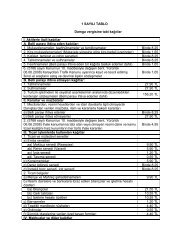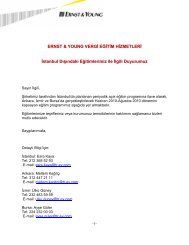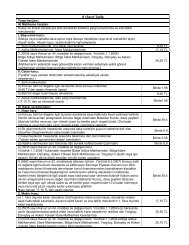Concise tax guide for Turkey 2009
Concise tax guide for Turkey 2009
Concise tax guide for Turkey 2009
Create successful ePaper yourself
Turn your PDF publications into a flip-book with our unique Google optimized e-Paper software.
6<strong>Concise</strong> <strong>tax</strong><strong>guide</strong> <strong>for</strong><strong>Turkey</strong> <strong>2009</strong>
PREFACEThe in<strong>for</strong>mation in this booklet is current at 6 January<strong>2009</strong> and intended to provide a general and conciseguidance on Turkish <strong>tax</strong>ation system only. Because ofrapidly changing and complex legal regulations, readersare strongly advised to obtain updated and detailedin<strong>for</strong>mation be<strong>for</strong>e engaging in any transaction or makingany decision. Ernst & Young <strong>Turkey</strong> assumes noresponsibility in respect of the contents of this <strong>guide</strong>. Ifthe readers, in any way, choose to rely on the contentsof this <strong>guide</strong>, they do so entirely at their own risk.All in<strong>for</strong>mation contained in this publication is copyrightedin the name of Ernst & Young <strong>Turkey</strong> and as such no partof this publication may be reproduced, repackaged,redistributed, resold in whole or in any part, or used inany <strong>for</strong>m or by any means graphic, electronic ormechanical, including photocopying, recording, taping,or by in<strong>for</strong>mation storage or retrieval, or by any othermeans, without the express consent of the publisher.
ContentsI. Individual <strong>tax</strong>ation .................................................................................4A. Income <strong>tax</strong> .............................................................................................51. Tax rates.................................................................................................52. Who Is liable..........................................................................................63. Income subject to <strong>tax</strong> .........................................................................74. Taxation of employer-provided stock options............................105. Deductions ............................................................................................116. Tax credits on salary/wage ..............................................................117. Relief <strong>for</strong> losses ..................................................................................12B. Filing and payment procedures ........................................................12C. Tax relief on <strong>for</strong>eign income ..............................................................13D. Social security......................................................................................13II. Corporate <strong>tax</strong>ation..............................................................................15A. Corporate income <strong>tax</strong>.........................................................................161. Tax rates................................................................................................162. Participation exemption...................................................................183. Turkish international holding companies.....................................194. Capital gains........................................................................................195. Administration...................................................................................206. Dividends ............................................................................................207. Foreign <strong>tax</strong> relief...............................................................................20B. Determination of trading income ....................................................221. General..................................................................................................222. Provisions............................................................................................233. Tax depreciation................................................................................234. Investment allowance......................................................................245. Research and development (R&D) expenditures......................246. Relief <strong>for</strong> losses.................................................................................24C. Miscellaneous matters ......................................................................251. Foreign-exchange controls..............................................................252. Transfer pricing.................................................................................253. Debt-to-equity rules (thin capitalization)....................................264. Controlled <strong>for</strong>eign companies (CFCs)..........................................265. Anti-avoidance measures ...............................................................266. Mergers and acquisitions ................................................................277. Other incentives on R&D activities ...............................................27
III. Other <strong>tax</strong>es.........................................................................................28III.i. Taxes on expenditure......................................................................30A. Value added <strong>tax</strong> (VAT).......................................................................301. General .................................................................................................302. VAT rates ............................................................................................303. Exemptions ..........................................................................................314. VAT assessment base......................................................................325. Non-deductible VAT .........................................................................326. Reverse charge VAT.........................................................................32B. Banking and insurance transaction <strong>tax</strong> (BITT).............................33C. Special consumption <strong>tax</strong> (SCT) .......................................................33D. Stamp <strong>tax</strong>.............................................................................................34E. Special communication <strong>tax</strong> ..............................................................35F. Tax on customs....................................................................................35III.ii. Taxes on wealth ..............................................................................36A. Inheritance and gift <strong>tax</strong> ....................................................................36B. Motor vehicle <strong>tax</strong>................................................................................36C. Real Estate <strong>tax</strong>....................................................................................36III.iii. Other <strong>tax</strong>es, charges and duties.................................................37A. Municipal <strong>tax</strong>es ...................................................................................37B. Duties....................................................................................................37Appendices...............................................................................................38Appendix 1: Taxability of income items ..............................................38Appendix 2: Sample individual income <strong>tax</strong> calculation ...................39Appendix 3: WHT rates applicable under double <strong>tax</strong> treaties .......40
I. Individual <strong>tax</strong>ation4
A. Income <strong>tax</strong>1. Tax ratesIn principle, individual income and gains are subject to income <strong>tax</strong> atprogressive <strong>tax</strong> rates which vary between 15% and 35% and calculated ona cumulative basis. The brackets <strong>for</strong> the year <strong>2009</strong> and relevant income<strong>tax</strong> rates are provided below.Taxable IncomeExceeding TL Not Tax On Lower Tax Rate OnExceeding TL Amount TL Excess0 8,700 - 15%8,700 22,000 1,305 20%22,000 50,000 3,965 27%50,000 - 11,525 35%On the other hand, certain individual (both <strong>for</strong> resident and non-resident)income and gains are subject to withholding <strong>tax</strong> (WHT). WHT is withheldand filed by the local company which provides income to resident or nonresidentindividuals. In the presence of Double Tax Treaty (DTT) it mightbe possible to reduce the <strong>tax</strong> rates or omit the <strong>tax</strong>ation in <strong>Turkey</strong> <strong>for</strong> theincome and earnings derived by non-resident individuals. Please see Appendix3 <strong>for</strong> the list of countries with which <strong>Turkey</strong> has concluded DTT.5
Major individual income and gains which are subject to WHT and relevantlocal WHT rates are summarized in the table below.Individuat incomesubject to WHTResidentNonresidentEmployment income (wage, bonus, fringebenefits etc.) 15-35 % 15-35 %Income from professional services 20 % 20 %Progress billings on long-termconstructions 3 % 3 %Income from sales of rights, otherintangible assets N/A 20 %Rental income (both tangibles andintangibles) 20 % 20 %Dividend income (e) 15 % (e) 15 %Time deposit interest and repo gains 15 % 15 %Interest income from TurkishGovernment bonds and Treasury Bills (a) 10 % 0 %Capital gains from sale of TurkishGovernment bonds and Treasury Bills (b) 10 % (b) 0 %Capital gains from sale of sharestraded at Istanbul Stock Exchange (ISE)and held less than 1 year. (c) 0 % (c) 0 %Capital gains from sale of shares ofinvestment trusts traded at Istanbul StockExchange (ISE) 10 % 0 %Income from investment funds (d) 10 % 0 %(a) 0% <strong>for</strong> those issued be<strong>for</strong>e 01.01.2006(b) The capital gains derived from the sale of Government bonds and Treasury bills thatare issued be<strong>for</strong>e 01.01.2006 are not subject to WHT. They are subject to declaration.(c) Capital gains derived from sale of shares which have been acquired be<strong>for</strong>e 01.01.2006or those which are traded at ISE and held more than 1 year are not subject to <strong>tax</strong>.(d) WHT is not applicable <strong>for</strong> investment funds <strong>for</strong>med by shares constituting at least51% of the portfolio and which is registered at Istanbul Stock Exchange and heldmore than 1 year.(e) Conversion of profits into capital is not regarded as dividend distribution and is notsubject to dividend WHT.2. Who is liableIndividuals who are resident in <strong>Turkey</strong> are subject to <strong>tax</strong> on their worldwideincome and they are regarded as full <strong>tax</strong> liable in <strong>Turkey</strong>. Nonresidents are<strong>tax</strong>ed only on earnings and revenues derived in <strong>Turkey</strong> and they are regardedas limited <strong>tax</strong> liable in <strong>Turkey</strong>.Residents include individuals with legal permanent residence in <strong>Turkey</strong> andthose who reside in <strong>Turkey</strong> <strong>for</strong> more than six months during one calendaryear (Provisional absence shall not interrupt the continuity of residing in<strong>Turkey</strong>).6
The civil law defines residency as an 'intention to settle down'. Althoughthe law does not specify any objective criteria <strong>for</strong> the residency, the factorssuch as purchasing an apartment in <strong>Turkey</strong> and closing business operationsabroad or having vital interests (social and economic) in <strong>Turkey</strong> may beconsidered in determination of Turkish residency status.Overriding the six-month rule in item above has a special exception thatapplies to expatriates such as businessman, scientists, experts, employeesof governments or journalists who come to <strong>Turkey</strong> to per<strong>for</strong>m temporaryand pre-defined work as well as those who have arrived <strong>for</strong> the purpose ofeducation, medical treatment, rest and travel. Such persons will still beconsidered as non-resident even if they stay in <strong>Turkey</strong> longer than sixmonths in a calendar year.Generally, if an individual is a non-resident of <strong>Turkey</strong> under these rules, hewill also be a non-resident <strong>for</strong> purposes of the application of <strong>Turkey</strong>'s <strong>tax</strong>treaty network. This may affect the <strong>tax</strong>ation of non-Turkish income in thesource country.3. Income subject to <strong>tax</strong><strong>Turkey</strong> has unitary <strong>tax</strong> system under which income derived from differentsources is aggregated and <strong>tax</strong> due is computed on the total aggregateincome. Under the unitary system, WHTs are considered advance paymentsof the <strong>tax</strong> and are credited against the <strong>tax</strong> due in the annual return. Tax isimposed on a calendar year basis in <strong>Turkey</strong>. Further, income derived in<strong>Turkey</strong> by residents and non-residents are categorized into seven types.These seven categories are:1. Commercial income2. Agricultural income3. Salary and Wage income (remuneration)4. Self-employment earnings5. Revenues from immovable properties (including royalties)6. Income from Capital investments (i.e. interest and dividends)7. Other earnings and gains (i.e. capital gains)Just as significant as the type of income is where the income is generated,i.e., inside or outside <strong>Turkey</strong>.Foreigners who have full <strong>tax</strong> liability status in <strong>Turkey</strong> are <strong>tax</strong>ed on theirincome derived both in <strong>Turkey</strong> and outside <strong>Turkey</strong>.The sources of income in <strong>Turkey</strong> <strong>for</strong> limited liable <strong>tax</strong>payers (non-residents)are determined as follows:Commercial Income. Income derived from every kind of commercial andindustrial operation through a place of business in <strong>Turkey</strong>, or through apermanent representative in <strong>Turkey</strong>, is considered as income derived in<strong>Turkey</strong>.Agricultural Income. Income arising from agricultural operations carriedout in <strong>Turkey</strong> is considered as derived in <strong>Turkey</strong>.7
Salary and Wage Income. Salary and wages are defined as money andgoods given as compensation to employees in association with a specificplace of business as well as benefits that are provided to them and can berepresented in terms of money. There is no distinction between salary andwages in <strong>Turkey</strong>, so “wages” is used <strong>for</strong> both in the following. Whetherwages are paid as cash, indemnity, allowances, overtime, advances,subscriptions, premiums, bonuses, expense accruals or as a percentage ofprofit which is not related to a partnership, the essence does not change.Certain payments made by the employer on behalf of the employee, suchas payment <strong>for</strong> rent and utilities are grossed up and <strong>tax</strong>ed as salary andwage income.Fulfillment of the following conditions indicates that the wage income isacquired in <strong>Turkey</strong> <strong>for</strong> individuals with limited liability:a) If the employment service is per<strong>for</strong>med in <strong>Turkey</strong> or,b) If the services are “evaluated” in <strong>Turkey</strong>.An employment service will be considered as having been evaluated in<strong>Turkey</strong> if the salary amount is booked as cost or expense by the Turkishentity.In determining <strong>tax</strong>able income, expenses allowable under the income <strong>tax</strong>law are deducted from gross revenue.Individuals in <strong>Turkey</strong> who work <strong>for</strong> nonresident entities whose legal andbusiness headquarters are not located in <strong>Turkey</strong> and who are paid in <strong>for</strong>eigncurrency are not <strong>tax</strong>ed on their salaries if all of the following conditions aremet (this exemption is usually applicable <strong>for</strong> liaison office employees):The nonresident entity pays the salaries out of earnings derived abroad;The salary payments are not charged as expenses against profits <strong>tax</strong>ablein <strong>Turkey</strong>; andThe amount of compensation is brought into <strong>Turkey</strong> as <strong>for</strong>eign currency.Professional (Self-Employment) Income. Self-Employment earnings includeservices rendered by a person who works on behalf of himself in his nameusing his own professional knowledge without being dependent to anemployer. If benefit is derived from self-employment activities per<strong>for</strong>medin <strong>Turkey</strong> or the self-employment activities are evaluated in <strong>Turkey</strong>, thisindicates that self-employment earnings are acquired in <strong>Turkey</strong> <strong>for</strong> individualswith limited liability.Services which are rendered by resident and/or nonresident individuals aresubject to withholding <strong>tax</strong> of 20% and the recipient of the services files aWHT return to the <strong>tax</strong> office on behalf of the professionals. If the serviceprovider is nonresident, provisions of DTTs are taken into consideration.Provisions of DTTs might prevent <strong>tax</strong>ation of such income in <strong>Turkey</strong>.Revenues from Immovable Properties. Revenues acquired from rental ofimmovable properties and rights by their owners, by their holders, by thoseholding easement and usufruct rights or by their tenants are <strong>tax</strong>able in<strong>Turkey</strong> (if the immovable property is located in <strong>Turkey</strong> or if such propertiesand rights are used or evaluated in <strong>Turkey</strong>).8
Rental income derived by resident and nonresident individuals fromimmovable assets and royalties <strong>for</strong> patents and rights are subject to WHTat a rate of 20%. This WHT may be eliminated or reduced under applicableDTTs if the income is derived by non-resident individuals.Capital Investment Income. The following types of income are included ininvestment income;a) Dividends from all types of share certificatesb) Earnings arising from participation sharesc) Profits distributed to the chairman and members of the board of directorsof companiesd) Interest income derived from public and private bonds and treasury billse) All interest income (Time deposits, Repo and others)Dividends derived by resident and nonresident individuals are subject to15 % WHT. The profit added to capital is not subject to dividend WHT. WHTis the final <strong>tax</strong>ation <strong>for</strong> the non-resident individuals. Half of the grossdividend amount, which is obtained by the resident individuals from Turkishresident companies, is subject to income <strong>tax</strong> declaration, if this dividendamount together with the other income generated by immovable propertiesand investment on securities is higher than TL 22,000. In this case, it isdeclared together with all these gains via annual income <strong>tax</strong> return and thedividend WHT amount is offset from the income <strong>tax</strong> accrued.Time deposit interests and REPO gains derived by resident and nonresidentindividuals are subject to 15% WHT. They are not declared via annual income<strong>tax</strong> return. The WHT is the final <strong>tax</strong>ation.Interest income from government bonds and treasury bills (issued after01.01.2006) derived by resident individuals are subject to 10% WHT whileit is 0% <strong>for</strong> those which are derived by non-resident individuals. They arenot declared via annual income <strong>tax</strong> return. WHT is the final <strong>tax</strong>ation.Interest income from government bonds and treasury bills (issued be<strong>for</strong>e01.01.2006) is subject to WHT but the WHT rate is 0%. For nonresidentindividuals, they are not declared via annual income <strong>tax</strong> return and WHTis the final <strong>tax</strong>ation. For resident individuals, they are declared if the amounttogether with other dividend, interest income and income from immovableproperties exceeds TL 22,000 <strong>for</strong> <strong>2009</strong>. For securities denominated in TL,inflation adjustment is applicable in the determination of <strong>tax</strong>able income.Capital Gains and Other Earnings. Some of capital gains and other earningsare as follows;a) Earnings arising from the sale of securities, rights, copyrights, patentsb) Earnings arising from the disposal of land, immovable, ships within thefirst five years of the acquisition.c) Earnings arising from the transfer of rights of partnership sharesd) Earnings arising from disposal as a whole or a part of an operation whoseactivities are haltede) Incidental earnings9
Capital gains derived by resident individuals from sale of shares tradedat Istanbul Stock Exchange (ISE) and held less than 1 year are subject to0% WHT. WHT is the final <strong>tax</strong>ation. Capital gains derived from sale of shares(i) acquired be<strong>for</strong>e 01.01.2006 or (ii) traded at ISE and held more than 1year, are not subject to WHT.Capital gains derived by resident and non-resident individuals from saleof shares not traded at (ISE) (if the disposal of the shares occurs withoutthe intermediation of a bank or an intermediary institution) are <strong>tax</strong>ed overgeneral progressive income rates and filed via annual income <strong>tax</strong> return.However, if the shares are of the Turkish resident companies and held <strong>for</strong>more than 2 years, the gain is not subject to income <strong>tax</strong>.If the shares are acquired be<strong>for</strong>e 01.01.2006, capital gains derived byresident and non-resident individuals from the sale of shares which areissued by resident Turkish Companies are not subject to income <strong>tax</strong> on thecondition that it is acquired gratuitously; or traded at ISE and held <strong>for</strong> morethan 3 months; or not traded at ISE but held <strong>for</strong> more than 1 year. Capitalgains derived by resident and non-resident individuals from the sale ofshares are declared, if the amount together with other capital gains exceedsTL 17.900 <strong>for</strong> <strong>2009</strong>.Capital gains from the sale of government bonds and treasury bills (issuedafter 01.01.2006) are subject to 10% WHT <strong>for</strong> resident individuals and 0%WHT <strong>for</strong> nonresident individuals. WHT is the final <strong>tax</strong>ation.Capital gains from the sale of government bonds and treasury bills (issuedbe<strong>for</strong>e 01.01.2006) are not subject to withholding <strong>tax</strong>. They are declaredboth by resident and non-resident individuals if the amount together withother capital gains exceeds TL 17,900 <strong>for</strong> <strong>2009</strong>. TL 17,900 of total capitalgains is exempt from income <strong>tax</strong>. Inflation adjustment is applicable in thedetermination of <strong>tax</strong>able income.4. Taxation of employer-provided stock options.No specific rules in <strong>Turkey</strong> govern the <strong>tax</strong> treatment of employer-providedstock options. Under the general <strong>tax</strong> provisions, options are <strong>tax</strong>able asemployment income at the time of exercise (please note that the <strong>tax</strong>ationtime may be different depending on the each stock option plan). In addition,under certain circumstances, stock options are subject to stamp <strong>tax</strong> at arate of 0.6% and may be subject to social security contributions(see Section D, Social Security).10
5. Deductions.Individuals who render independent professional services or those who arecarrying out commercial activities may deduct from <strong>tax</strong>able income ordinarybusiness related expenses, including salaries, rental payments, fees andthe cost of utilities. Depreciation on fixed assets is also allowed. Penaltiesshall not be deductible.The employee parts of social security contributions and unemploymentinsurance premiums shall be deductible from gross employment income indetermination of the income <strong>tax</strong> base.The premiums paid by the employee <strong>for</strong> himself, his/her spouse or childrenrelated to the personal insurance policies covering life, death, accident,illness, disablement, unemployment, maternity, birth and education, as wellas the contributions paid to the Individual Retirement System can beconsidered as deduction in determination of income <strong>tax</strong> base. However, thefollowing conditions should be fulfilled in order to apply deduction:The insurance policy and the retirement contract should be concludedwith an insurance company which is situated in <strong>Turkey</strong> and whoseheadquarters is in <strong>Turkey</strong>,The amount of the monthly premium, membership fee or contributionsthat are paid to Individual Retirement System, should not exceed 10% ofthe salary earned on that month (The premiums paid <strong>for</strong> the personalinsurance policies other than Individual Retirement System should notexceed 5% of the wage earned on the month when the premium waspaid). The annual totals of the monthly premiums, membership fees andcontributions paid, should also not exceed the annual total amount of thelegal minimum wage.Lightening, heating, water, elevator, administration, insurance, interest,<strong>tax</strong>, depreciation and maintenance expenses paid by the individual whogains rental income can be deducted from <strong>tax</strong>able rental income.The <strong>tax</strong>ation of various types of income is described above. For a tableoutlining the <strong>tax</strong>ability of income items, see Appendix 1. For a sampleindividual income <strong>tax</strong> calculation, see Appendix 2.6. Tax credits on salary/wage.“The Minimum Living Allowance” can be deducted from the <strong>tax</strong> onemployment income. The minimum living allowance applicable <strong>for</strong> eachmonth of employment may not exceed 50% of the monthly gross amountof legal minimum wage that is effective at the beginning of the calendaryear (TL 666.00 <strong>for</strong> <strong>2009</strong>) in which the wage is earned (the upper levelpercentage is 10% <strong>for</strong> a spouse who is unemployed and does not earnincome; 7.5% <strong>for</strong> the first two children and 5% <strong>for</strong> other children.The <strong>tax</strong> credit is calculated by multiplying the total minimum allowanceamount by 15%. However, the credit can not exceed the total <strong>tax</strong> calculatedon the employment income and no refund is granted in the event of anexcess amount.Minimum Living Allowance is not applicable <strong>for</strong> non-resident individualswho derive employment income in <strong>Turkey</strong>.11
Please find below sample minimum living allowance calculations <strong>for</strong> differentassumptions.AssumptionCalculation of monthlyamount to be deductedAmount(TL)Single Employee 666.00 x 50% x1 5% 49.95Married with a non-working 666.00 xwife (50%+10%) x 15% 59.94Married with a non-working 666.00xwife + 2 children (50%+10%+7,5%+7,5%) x 15% 74.93Married with a non-working 666.00 xwife + 3 children (50%+10%+7,5%+7,5%+5%) x 15% 79.92Married with a workingwife + 1 children 666.00 x (50%+7,5%) x 15% 57.44Married with a working 666.00 xwife + 4 children (50%+7,5%+7,5%+5% +5%) x 15% 74.937. Relief <strong>for</strong> LossesSelf-employed individuals engaged in a business or individuals who carryout commercial activities may carry <strong>for</strong>ward <strong>tax</strong> losses <strong>for</strong> five years. Noloss carry backs are allowed.B. Filing and payment proceduresEmployers must withhold income <strong>tax</strong> from salaries and wages paid toemployees. All kind of WHT shall be declared monthly on 23 rd day and paidon 26 th day of the following month of payment (in cash or accrual).A <strong>tax</strong>payer who derives commercial or self-employment income must fileand pay advance income <strong>tax</strong> quarterly. The advance <strong>tax</strong> amount equals 15%of net income. The advance payments shall be made until the 17th day ofthe following second month of the quarterly <strong>tax</strong> period. Advance <strong>tax</strong> amountspaid are deducted from the final income <strong>tax</strong> amount to be declared viaannual income <strong>tax</strong> return.Annual income <strong>tax</strong> returns shall be submitted to <strong>tax</strong> authorities between1-25 March of the following year and payment shall be made in 2 equalinstallments on March and July.Tax resident individuals have the <strong>tax</strong> credit opportunity. The <strong>tax</strong>es paidabroad <strong>for</strong> the income derived outside <strong>Turkey</strong> and subject to <strong>tax</strong>ation in<strong>Turkey</strong> can be deducted from the <strong>tax</strong> payable in <strong>Turkey</strong>. There is no <strong>for</strong>eign<strong>tax</strong> credit application <strong>for</strong> limited <strong>tax</strong>payers (non-residents) since <strong>tax</strong> deductionis only applicable <strong>for</strong> full <strong>tax</strong> liables.The <strong>tax</strong> amount to be applied as <strong>for</strong>eign <strong>tax</strong> credit <strong>for</strong> the full <strong>tax</strong> liablepersons is limited with <strong>tax</strong> amount to be paid in <strong>Turkey</strong> <strong>for</strong> the same incomeamount. In other words, if the <strong>tax</strong> rate applied in other country is greaterthan the <strong>tax</strong> rate applicable in <strong>Turkey</strong> then difference cannot be consideredas <strong>for</strong>eign <strong>tax</strong> credit. The portion of the income <strong>tax</strong> corresponding to theearnings acquired in <strong>for</strong>eign countries shall be calculated on the basis oftheir ratio to income.12
In order <strong>for</strong> the <strong>tax</strong> deduction specified above to be made it is essentialthat:1. The <strong>tax</strong>es paid in the <strong>for</strong>eign country shall be a personal <strong>tax</strong> levied on thebasis of income.2. The payment of the <strong>tax</strong> in a <strong>for</strong>eign country shall be substantiated withdocuments obtained from competent authorities and attested to by thelocal Turkish Embassy or Consulate, or if these are lacking, by similarrepresentatives of <strong>Turkey</strong> in that country.Nonresidents are generally not required to file income <strong>tax</strong> returns if theyhave only earnings subject to WHT. Withholding is final <strong>tax</strong>ation. Nonresidentindividuals or Turkish citizens who reside in <strong>Turkey</strong> with the intention ofstaying or expatriates who derive incomes not subject to WHT must fileannual income <strong>tax</strong> returns <strong>for</strong> other sources of earnings, including commercialincome.When non-resident individuals leave <strong>Turkey</strong>, they must file an “occasional”<strong>tax</strong> return 15 days be<strong>for</strong>e their departure.Non-resident individuals, who are not obliged to file annual income <strong>tax</strong>return, have to file a special <strong>tax</strong> return <strong>for</strong> their certain gains listed in IncomeTax Code. The special <strong>tax</strong> returns are declared within 15 days following thegains acquired. For the gains related with self-employment earnings of thelimited <strong>tax</strong>payers, the special <strong>tax</strong> return is declared within 15 days followingthe activities ended.C. Tax relief on <strong>for</strong>eign incomeA credit is available <strong>for</strong> <strong>for</strong>eign <strong>tax</strong>es paid up to the amount of Turkish <strong>tax</strong>applicable on the underlying <strong>for</strong>eign-source income.D. Social securityTurkish Social Security System was previously based on three institutionseach regulated by its own law. These institutions were the Social SecurityInstitution (<strong>for</strong> private sector employees), the Pension Fund (<strong>for</strong> publicsector employees) and the Bag-Kur (<strong>for</strong> self employed people). Effectivefrom 01.10.2008, a new Code named as Social Security and General HealthInsurance Law No.5510 has been entered into <strong>for</strong>ce and it has unified theprevious 3 social security legislations.All employees of Turkish private entities are subject to a national socialinsurance system that covers work-related accidents and illness, generalsocial security and disability and death. It also provides retirement benefits.Employers and employees pay monthly contributions at varying percentagescalculated on gross salary up to a ceiling amount stated in the Social SecurityLaw. The upper limit of <strong>2009</strong> <strong>for</strong> monthly salary subject to social securitycontributions is TL 4,329.00 and the lower limit is TL 666.00 (note thatthe figures are valid between 01.01.<strong>2009</strong>-30.06.<strong>2009</strong>. Employees paycontributions at a rate of 14%; their employers pay at a rate changingbetween 19.5% and 25% according to the class risk of the business. 5% ofthe employer share can be reimbursed by the Treasury if certain conditionsare fulfilled by the employer. The rate of unemployment insurance premiumis 1% <strong>for</strong> employees and 2% <strong>for</strong> the employers.13
Employees who are subject to social security contributions in their homecountry may not be subject to social security contributions in <strong>Turkey</strong> if theyprove their social security status by submitting legal documents obtainedfrom the relevant <strong>for</strong>eign social security institution.To provide relief from double social security premiums and to assure benefitcoverage, <strong>Turkey</strong> has entered into totalization (bilateral) agreements, whichusually apply <strong>for</strong> a maximum of two years, with the following countries:Albania Denmark Northern CyprusAustria France NorwayAzerbaijan Georgia QuebecBelgium Germany RomaniaBosnia- Libya SwedenHerzegovina Luxembourg SwitzerlandCanada Macedonia United KingdomCzech RepublicNetherlands<strong>Turkey</strong>, on the other hand is one of the parties of European Social SecurityAgreement. Article 15-1/a of the Agreement contains the following provision:Workers employed by a corporation which has a normal employer in oneof the contracting states, who are sent to another contracting state <strong>for</strong> aspecific piece of work <strong>for</strong> the corporation, are subject to the legislation ofthe state where they were originally employed, provided that the estimatedperiod of employment in that state does not exceed 12 months and thatsuch workers are not sent to replace workers whose periods of employmenthave ended.In cases where the work takes longer than 12 months <strong>for</strong> un<strong>for</strong>eseen reasons,the employment law of the country of origin will continue to apply until theend of the work, subject to the agreement of the authorities in the countrywhere the work is being carried out.14
II. Corporate <strong>tax</strong>ation15
A. Corporate income <strong>tax</strong>Companies whose legal or business headquarters (as stated in their articlesof association) are located in <strong>Turkey</strong> or whose business activities areintensified and managed in <strong>Turkey</strong> are subject to corporate <strong>tax</strong> on theirworldwide income. In Turkish <strong>tax</strong> legislation, they are defined as full liability<strong>tax</strong>payers; also known as resident companies.Taxable income of limited liability <strong>tax</strong>payers (nonresident companies or<strong>tax</strong>payers other than full liability <strong>tax</strong>payers) is comprised of the following:Professional fees obtained in <strong>Turkey</strong>;Profits from commercial, agricultural and industrial enterprises in <strong>Turkey</strong>(if they have an establishment or a permanent representative in <strong>Turkey</strong>);Income arising from leasing of movable and immovable property andintangible rights in <strong>Turkey</strong>;Income obtained in <strong>Turkey</strong> from various types of securities; andOther income and revenues obtained in <strong>Turkey</strong>.1. Tax rates.In principle, corporate income is subject to corporate <strong>tax</strong> at 20% and allincome types listed in the “Individual Taxation” section are considered ascorporate income if it is derived by a company.On the other hand, certain corporate income and gains (both <strong>for</strong> residentand non-resident) are subject to withholding <strong>tax</strong> (WHT). WHT is imposedand filed by the local company which provides income to other resident ornon-resident companies. In the presence of Double Tax Treaty (DTT) itmight be possible to reduce the applicable <strong>tax</strong> rates or eliminate the <strong>tax</strong>ationin <strong>Turkey</strong> <strong>for</strong> the income and earnings derived by non-resident companies.Please see Appendix 3 <strong>for</strong> the list of countries with which <strong>Turkey</strong> hasconcluded DTT.The main corporate income and gains subject to WHT and relevant localWHT rates are summarized in the table below:16
Individuat incomesubject to WHTResidentNonresidentIncome from professional services 20 %Progress billings on long-term constructions 3 % 3 %Income from sales of rights, other intangible assets 20 %Rental income (both tangibles and intangibles) 20 %Royalties, Know-how, etc. 20 %Dividend income (d) 15 %Branch remittance 15 %Time deposit interest and REPO gains 15 % 15 %Interest income from state and treasury bonds (a) 10 % 0 %Capital gains from sale of state and treasury bonds (a) 10 % 0 %Capital gains from sale of shares traded at IstanbulStock Exchange (ISE) and held less than 1 year. (b1) 0 % (b2) 0 %Income from funds (c) 10 % 0 %Income from financial leasing (g) 1 %All kinds of income provided to companies whichare resident in low <strong>tax</strong> jurisdictions (e) 30 %Interest income over receivables (f) 10 %Income from petroleum exploration activities 5 %(a) The WHT is applied as 0% <strong>for</strong> those that were issued be<strong>for</strong>e 01.01.2006. The incomeis subject to corporate <strong>tax</strong> by 20% together with the other corporate income. The WHTis offset from payable corporate <strong>tax</strong> or refundable in case there is not any <strong>tax</strong>able profit.(b1) Capital gains derived by sale of shares (i) acquired be<strong>for</strong>e 01,01.2006 or (ii) tradedat ISE and held more than 1 year or (iii) sold without stock broker are not subject to WHT.It is normally included within <strong>tax</strong>able profit and subject to 20% corporate <strong>tax</strong>. However,75% of which may qualify <strong>for</strong> <strong>tax</strong> exemption as explained in section “4. Capital Gain”.(b2) Capital gains derived by sale of shares acquired be<strong>for</strong>e 01.01.2006 are subject to20% corporate <strong>tax</strong>. The residual amount after corporate <strong>tax</strong> is subject to 15% WHT. Thusthe total <strong>tax</strong> burden is 32% in <strong>Turkey</strong>. Corporate <strong>tax</strong> and WHT filing is fulfilled by nonresidentcorporation by itself or by its representatives.Capital gains derived by sale of shares acquired after 01.01.2006 and traded at ISE andheld more than 1 year are not subject to WHT. Capital gains derived by sale of sharesacquired after 01.01.2006 and traded at ISE and held less than 1 year are subject to 0%WHT. No corporate <strong>tax</strong> filing is required <strong>for</strong> these gains. Capital gains derived by sale ofthose which are not traded at ISE are subject to 20% corporate <strong>tax</strong>. The residual amountafter corporate <strong>tax</strong> is subject to 15% WHT. Corporate <strong>tax</strong> and WHT filing is fulfilled bynon-resident corporation by itself or by its representatives.(c) The WHT is applied as 0% <strong>for</strong> the investment funds <strong>for</strong>med by the shares at least 51%of which is registered at Istanbul Stock Exchange and held more than 1 year.(d) Conversion of profits into capital is not regarded as dividend distribution and is notsubject to dividend WHT.(e) Please see detailed explanation at Section C.5. Anti-avoidance Measures.(f) The WHT is applied as 0% <strong>for</strong> interests charged by banks. The principal of loans thatare in <strong>for</strong>eign currency and that are remitted to Turkish residents (excluding banks andother financial institutions) by <strong>for</strong>eign financial institutions and that have an averagematurity of less than one year are subject to a 3% contribution to the Resource UtilizationSupport Fund (RUSF).(g) For the application of 1% WHT, the operation should be within the scope of FinancialLeasing Act # 3226.17
2. Participation exemption(a) Dividend income derived from Turkish (resident) participations. Turkish<strong>tax</strong> legislation provides participation exemption <strong>for</strong> dividends derived bycompanies from Turkish (resident) participations. Dividends qualifying <strong>for</strong>the participation exemption are fully exempt from corporate <strong>tax</strong>.(b) Dividend income derived from <strong>for</strong>eign (non-resident) participations.Turkish <strong>tax</strong> legislation also provides participation exemption <strong>for</strong> dividendsderived by Turkish companies from <strong>for</strong>eign participations. Dividends qualifying<strong>for</strong> the participation exemption are fully exempt from corporate <strong>tax</strong>.To qualify <strong>for</strong> the participation exemption <strong>for</strong> dividends derived from <strong>for</strong>eignparticipations, all of the following conditions must be satisfied:Turkish company must have owned at least 10% of the shares of the<strong>for</strong>eign company <strong>for</strong> an uninterrupted period of at least one year as ofthe date of receiving the dividend;The <strong>for</strong>eign company must be in the nature of a limited or joint stockcompany; andThe <strong>for</strong>eign company must be subject to corporate <strong>tax</strong> at an effectiverate of at least 15% (<strong>for</strong> corporations whose principal activities is theprocurement of finance and insurance, the rate must be at least the rateof corporation <strong>tax</strong> in <strong>Turkey</strong>, which is 20%).Participation income must be transferred to <strong>Turkey</strong> by the due date offiling of the annual corporate <strong>tax</strong> return (25 th of April <strong>for</strong> the <strong>tax</strong>payerswith normal fiscal period).The effective corporate <strong>tax</strong> is determined in accordance with the following<strong>for</strong>mula:Effective corporate <strong>tax</strong> rate = corporate <strong>tax</strong> ÷ (distributable corporateincome + corporate <strong>tax</strong>)The participation exemption also applies to income derived from permanentestablishments (PEs) and permanent representative resident abroad if thefollowing conditions are met:The PE or permanent representative is subject to corporate <strong>tax</strong> at aneffective rate of at least 15% in the country where the PE or permanentrepresentative is located (<strong>for</strong> PEs whose principal activities are theprocurement of finance (including financial leasing) or investment inmarketable securities and insurance, the rate must be at least the rateof corporation <strong>tax</strong> in <strong>Turkey</strong>, which is 20%); andIncome derived from <strong>for</strong>eign PEs must be transferred to <strong>Turkey</strong> by thedue date of filing of the annual corporate <strong>tax</strong> return (25 April).Special participation exemption rules apply to companies established in<strong>for</strong>eign countries and whose principal purpose is undertaking, construction,repair, assembly and technical services. If, under the laws of a <strong>for</strong>eigncountry, the establishment of a corporation is necessary to undertake theseactivities, dividends repatriated by the <strong>for</strong>eign subsidiary to the Turkishparent company qualify <strong>for</strong> the participation exemption, regardless of18
whether the conditions described above <strong>for</strong> the participation exemptionare satisfied.A participation exemption also applies to capital gains under certainconditions. For details, see Section “B. Determination of Trading Income”.3. Turkish international holding companiesTurkish Tax Legislation provides a special regime <strong>for</strong> Turkish internationalholding companies with respect to their <strong>for</strong>eign participations.Turkish international holding companies may benefit from the participationexemption with respect to dividends derived from <strong>for</strong>eign participations ifthey satisfy the conditions applicable to other entities (see ParticipationExemption above).They may also benefit from the participation exemption with respect tocapital gains, derived from their <strong>for</strong>eign participations. In order to qualify<strong>for</strong> this exemption, the <strong>for</strong>eign participations of the holding company witha minimum 10% capital participation to <strong>for</strong>eign limited or joint stockcompanies, must constitute at least 75% of the non-cash assets of theinternational holding company at least uninterrupted 1 year period as thedate of which the capital gains derived and the capital gains must be derivedfrom the participation shares that held <strong>for</strong> at least two years.Additionally, dividends distributed by Turkish international holding companiesto nonresident companies out of profits derived from their <strong>for</strong>eignparticipations, are subject to one-half of the general 15% WHT rate ondividends. There<strong>for</strong>e, the dividend WHT rate can be applied as 7.5%.4. Capital gainsCapital gains derived by all companies, including branches of <strong>for</strong>eigncompanies, are included in ordinary income and are subject to corporate<strong>tax</strong>. Capital gains are generally computed by subtracting the cost of theasset, including the related expenses paid by the seller, from the sellingprice.Capital gains derived from sales of depreciable fixed assets are not <strong>tax</strong>ableto the extent the gains are reinvested in new fixed assets. However, theamount of gains used to acquire new assets is subtracted from the depreciablecost of the new asset. Capital gains that will be used <strong>for</strong> reinvestment aretransferred to a special reserve account. If the special reserve is not usedto finance the purchase of similar new assets in the following three years,the balance in the reserve is included in <strong>tax</strong>able income.Capital gains derived from sales of resident companies' shares by nonresidentcompanies are subject to corporate <strong>tax</strong> if these gains are derived in <strong>Turkey</strong>(In order to regard a capital gain arising from sale of shares by a nonresidentcorporation as derived in <strong>Turkey</strong>; the buyer should be located in<strong>Turkey</strong> or the sale should have been realized in <strong>Turkey</strong> by some othermeasures). In computing these gains, changes in exchange rates are nottaken into account.75% of capital gains derived by resident and non-resident companies fromdisposals of shares owned <strong>for</strong> at least two years qualify <strong>for</strong> corporate <strong>tax</strong>19
exemption on the condition that the capital gain is reserved in equity as aspecial fund and is not distributed <strong>for</strong> five years.5. AdministrationCompanies file <strong>tax</strong> returns based on their financial accounting year.Tax returns must be submitted to relevant <strong>tax</strong> office by the 25 th day of the4 th month after the end of the accounting period. The return must beaccompanied by the balance sheet, income statement and other requireddocuments.Corporation <strong>tax</strong> due must be paid by the end of the fourth month followingthe end of the accounting period.Companies must make quarterly payments of advance corporation <strong>tax</strong>during the <strong>tax</strong> year. The advance corporate <strong>tax</strong> rate is 20%. The advance<strong>tax</strong>es may be offset against the <strong>tax</strong> shown on the annual corporate <strong>tax</strong>return.If advance corporation <strong>tax</strong> exceeds the final <strong>tax</strong> payable, the excess can bededucted from the company's other <strong>tax</strong> liabilities or it can be refunded.6. DividendsDividends received from <strong>for</strong>eign companies are included in <strong>tax</strong>able income.However, certain dividends received from <strong>for</strong>eign companies may qualify<strong>for</strong> exemption from corporation <strong>tax</strong> under the participation exemption orthe international holding regime (see Dividends and Turkish InternationalHolding Regime above).15% WHT is imposed on dividends paid by resident corporations to thefollowing recipients: resident individuals; resident recipients who are notsubject to corporation <strong>tax</strong> and income <strong>tax</strong>, or are exempt from such <strong>tax</strong>es;nonresident individuals; nonresident corporations (excluding those receivingdividends through a PE or permanent representative in <strong>Turkey</strong>); andnonresident recipients who are exempt from corporation <strong>tax</strong> and income<strong>tax</strong>.A branch remittance <strong>tax</strong> is imposed at a rate of 15% on profits remitted bynonresident corporations that have a PE or permanent representative in<strong>Turkey</strong> to their headquarters.7. Foreign <strong>tax</strong> reliefThe corporate <strong>tax</strong> and similar <strong>tax</strong>es that are paid at abroad from the earningsthat have been acquired thereat, and which are transferred to the finalgeneral accounts in <strong>Turkey</strong> can be deducted from the corporation <strong>tax</strong> thatis assessed <strong>for</strong> such earnings in <strong>Turkey</strong>.In the cases where CFC rules are applied, the <strong>tax</strong>es that are similar toincome and corporation <strong>tax</strong>es, which the affiliate at abroad has paid, canbe set off against the corporation <strong>tax</strong> that shall be calculated on the basisof the earnings of the <strong>for</strong>eign company, which would be <strong>tax</strong>ed in <strong>Turkey</strong>.Resident companies that have a direct or indirect participation in sharesor voting rights of at least 25% in <strong>for</strong>eign subsidiaries can claim a <strong>tax</strong> credit20
<strong>for</strong> the corporate or income <strong>tax</strong> paid by <strong>for</strong>eign subsidiaries in theirjurisdictions on profits out of which dividend distributions were paid to theresident companies. The credit is limited to the <strong>tax</strong> in <strong>Turkey</strong> that isattributable to the dividend distributions. As a result, the credit applies onlyto dividends that do not qualify <strong>for</strong> the participation exemption.The <strong>for</strong>eign <strong>tax</strong> amounts paid <strong>for</strong> the earnings acquired in <strong>for</strong>eign countriesand to be offset against the <strong>tax</strong>es calculated in <strong>Turkey</strong> cannot, under anycircumstances, exceed the <strong>tax</strong> amount that would be calculated by applyingthe local corporate <strong>tax</strong> rate (20%) <strong>for</strong> these earnings.Foreign <strong>tax</strong> that cannot be offset against the corporate <strong>tax</strong> in <strong>Turkey</strong>because of insufficient corporate income may be carried <strong>for</strong>ward <strong>for</strong> aperiod of three years. The <strong>tax</strong> credit can also be offset against provisional<strong>tax</strong> payments.21
B. Determination of trading income1. GeneralThe corporate <strong>tax</strong> base is determined by deducting expenses from therevenue of an enterprise. However, the following items are not subject tocorporation <strong>tax</strong>:Revenue derived by corporations, including nonresident companies, fromparticipations in the capital of other corporations that are subject to fullcorporate <strong>tax</strong>ation, excluding shares of profits from participationcertificates of investment funds and stocks in investment partnerships;Proceeds derived by corporations from the sale of their preferred shares,and profits derived by joint stock companies from the sale of their sharesat the time of the establishment of the company and from the sale oftheir shares at a price exceeding the par value of the shares when theyare increasing their capital; and75% of profits derived from disposals of shares, preferred shares,preemptive rights, bonus shares or real estate owned <strong>for</strong> at least twoyears if the profit is placed in a reserve account and not distributed <strong>for</strong>five years.Corporation <strong>tax</strong> exemptions are available under the participation exemptionand the international holding regime (see Section A). In addition, the followingcorporate <strong>tax</strong> exemptions apply to Turkish and <strong>for</strong>eign investment fundsand companies:Profits derived by mutual funds (excluding <strong>for</strong>eign-exchange funds) andtrusts from transactions involving their operating portfolio. Profits derivedfrom such instruments by nonresidents are no longer subject to WHT.Profits derived by risk capital investment funds or companies fromtransactions involving their operating portfolio.Profits derived by real estate investment funds or companies fromtransactions involving their operating portfolio.Profits derived by designated private pension investment funds.All business-related expenses are deductible, with the following exceptions:Interest on shareholder's equity or on advances from shareholders.Reserves set aside from profits (except technical reserves of insurancecompanies and doubtful debts from debtors against whom legal proceedingshave been instituted).Corporation <strong>tax</strong> and all monetary and <strong>tax</strong> penalties and interest imposedon <strong>tax</strong>es.Discounts or other losses arising from selling the corporation's ownsecurities <strong>for</strong> less than par value.For nonresident companies, commissions, interest and other charges paidto headquarters or other offices outside <strong>Turkey</strong> on purchases or salesmade on their behalf, as well as allocated charges to contribute to lossesor expenses of headquarters or branches outside <strong>Turkey</strong>. However, charges22
are deductible if they are made in accordance with allocations keys thatare in compliance with arm's length principle and if they are related to thegeneration and maintenance of business income in <strong>Turkey</strong>.Interest, <strong>for</strong>eign-exchange differences or comparable expenses that arecalculated or paid on disguised capital (see Debt-to-Equity Rules in Section C).Disguised profit distribution through improper transfer pricing.2. ProvisionsTax-deductible provisions include provisions <strong>for</strong> bad debts and <strong>for</strong> insurancetechnical reserves.3. Tax depreciationThe assets used in a company <strong>for</strong> more than one year and also subject towear and tear, are subject to depreciation.Effective from 1 January 2004, the useful life principle was introduced withrespect to the depreciation of fixed assets. The Ministry of Finance hasissued a Communiqué, which sets <strong>for</strong>th the useful lives <strong>for</strong> different typesof fixed assets. The following are examples of the useful lives <strong>for</strong> variousfixed assets.AssetUseful Life(Years)Buildings 50Office furniture, office equipment and automobiles 5Computers 4Computer software and cellular phones 3The <strong>tax</strong>payers may select the straight-line method or the declining-balancemethod to calculate depreciation. A company may shift from the decliningbalancemethod to the straight-line method (but the reverse is not permitted)at any time during the useful life of a fixed asset. A company may usedifferent depreciation methods <strong>for</strong> each asset by considering the integrityof the fixed asset.Fixed assets can be depreciated starting from their capitalization year. Dateof capitalization of fixed asset is not important and even if a fixed asset iscapitalized in December, it shall be depreciated on annual basis. The onlyexception to this general rule is <strong>for</strong> the passenger cars, whose depreciationshall be started from the month in which they are purchased.For example, if a passenger car that was purchased <strong>for</strong> TL 1,000 is depreciatedusing a straight-line depreciation rate of 20%, the regular depreciation <strong>for</strong>a full year is TL 200. Under the applicable rules, if such an automobile isacquired in November, <strong>tax</strong>-deductible depreciation <strong>for</strong> the year of acquisitionis calculated as follows:2 months x TL 200 = TL 33.3312 monthsThe balance of the regular depreciation <strong>for</strong> the year of acquisition isdeductible in the last year of depreciation of the asset, together with theregular depreciation <strong>for</strong> the last year.23
4. Investment allowanceEffective from 1 January 2006, the investment allowance application wasabolished. 2008 was the last year <strong>for</strong> the rightful <strong>tax</strong>payers to use theinvestment allowances. Companies that elect to benefit from the investmentallowance are <strong>tax</strong>ed at a rate of 30% instead of the normal corporateincome <strong>tax</strong> rate of 20%.5. Research and development (R&D) expenditures100% of R&D expenditures might be deducted from <strong>tax</strong> base provided thatcertain conditions are fulfilled. This is an incentive mechanism in additionto ordinary expense recognition of R&D expenditures. The expenses whichare included under the scope of the expenditure items are stated below.Raw Materials and Supplies ExpensesPersonnel ExpensesGeneral ExpensesBenefits and Services Provided from OutsourceTax, Duty and FeesDepreciation and DepletionFinancial ExpensesCompanies which have not been able to deduct R&D expenditures due toinsufficient <strong>tax</strong>able income may deduct the unused amount in the followingyears.Please see other R&D related incentives in Section C.7.6. Relief <strong>for</strong> lossesIn general, losses may be carried <strong>for</strong>ward <strong>for</strong> five years. Losses cannot becarried back. An order of priority applies <strong>for</strong> the use of losses and exemptionsto offset against <strong>tax</strong>able income <strong>for</strong> the year. Past years' losses can beoffset after deducting the exemptions that are applied even if there is loss.Then the other exemptions (which are applicable in case of profit existence)will be applied (i.e. investment allowance, <strong>tax</strong> deductible donations).Resident companies may deduct the losses incurred in business activitiesper<strong>for</strong>med abroad if the <strong>for</strong>eign losses are approved by auditors authorizedunder the laws of the relevant jurisdiction. Foreign losses may not bededucted if income arising from the <strong>for</strong>eign activity would have been exemptfrom corporation <strong>tax</strong> in <strong>Turkey</strong>.24
C. Miscellaneous Matters1. Foreign-exchange controls<strong>Turkey</strong> has a liberal <strong>for</strong>eign-exchange regime, which allows local <strong>for</strong>eignexchangeaccounts.Law No. 4875 guarantees the remittance of profits. The company's bankmay transfer profits, provided the company subsequently submits to thebank its approved <strong>tax</strong> statement and its <strong>tax</strong> accrual and payment slips. Thislaw also guarantees the remittance of the proceeds from the liquidation ofan investment.Fees and royalties from management agreements, technical servicesagreements and license contracts may be remitted abroad, and applicableWHT must be deducted.Foreign investment partnerships and funds may invest in Turkish securitiesand freely remit dividends, interest, profits and capital.Recently, Turkish resident companies are allowed to procure loan to itsrelated parties which reside abroad.2. Transfer pricingNew transfer-pricing rules have been put into effect since 1 January 2007.Under the new rules, the traditional transfer-pricing methods recommendedin the Organization <strong>for</strong> Economic Cooperation and Development (OECD)model transfer-pricing <strong>guide</strong>lines are utilized. The traditional methodsmentioned in the <strong>guide</strong>lines are as follows:Comparable uncontrolled price method;Cost-plus method;Resale price method.However, <strong>tax</strong>payers may select other transfer-pricing methods if they canestablish that the traditional methods are not suitable <strong>for</strong> their transactions.It is also possible to enter into advance-pricing agreements with the <strong>tax</strong>authorities.The new transfer-pricing rules apply to both domestic and <strong>for</strong>eign relatedparty transactions. Commercial transactions conducted by persons residentin low-<strong>tax</strong> jurisdictions (<strong>tax</strong> havens) are considered as related-partytransactions.With the new transfer pricing regulations, the burden of proof has beenimposed on the <strong>tax</strong>-payer.The Ministry of Finance has issued two Communiqués and a Circular clarifyingthe transfer pricing rules, the concept of related party, the pricing methodsand the documentation requirements. Through the new regulation, <strong>tax</strong>payersare obliged to prepare transfer pricing <strong>for</strong>m and/or transfer pricing reportand to keep some documentation.25
3. Debt-to-equity rules (thin capitalization)Under the new thin-capitalization rules, a “related party” is a person holding,directly or indirectly, at least 10% of the shares or voting rights of the otherparty.Borrowings from related parties that exceed a debt-to-equity ratio of 3:1are considered to be disguised capital. For borrowings from related partiesthat are banks or financial institutions, half of the borrowings are takeninto consideration in the calculation of the disguised capital. Total borrowingsfrom all related parties are treated collectively.The equity at the beginning of the <strong>tax</strong>payer's fiscal year applies <strong>for</strong> thincapitalizationpurposes. Interest paid or accounted <strong>for</strong> and <strong>for</strong>eign-exchangedifferences related to disguised capital are regarded as nondeductibleexpenses in determining the corporate <strong>tax</strong> base. Interest related to disguisedcapital is also treated as dividend distributed and is subject to dividenddistribution withholding <strong>tax</strong>.4. Controlled <strong>for</strong>eign companies (CFCs)The CFC rules are applied if resident individuals and corporate <strong>tax</strong>payersjointly or severally have a direct or indirect participation of 50% or morein the shares, dividend rights or voting rights in a <strong>for</strong>eign company thatmeets all of the following conditions:Twenty-five percent or more of the <strong>for</strong>eign company's gross income is ofa passive nature (portfolio investment income). If the business activitiesof the company are not commensurate with the capital, organization orthe work <strong>for</strong>ce of the company, income derived from commercial,agricultural or independent personal services may be regarded to be ofa passive nature.The <strong>for</strong>eign company is subject to effective corporate <strong>tax</strong>ation at a rateof less than 10%.The gross revenue of the <strong>for</strong>eign company exceeds TL 100,000(approximately US$ 65,000).If the <strong>for</strong>eign company falls within the scope of the Turkish CFC measures,Turkish resident <strong>tax</strong>payers declare corporate income of the <strong>for</strong>eign companyattributable to them. In the event of a dividend distribution by the <strong>for</strong>eigncompany, the recipient of the dividend is <strong>tax</strong>ed only to the extent that theamount has not been <strong>tax</strong>ed in accordance with the CFC rules.5. Anti-avoidance MeasuresUnder a new measure, Turkish resident <strong>tax</strong>payers are subject to a 30%WHT on all payments made in cash or on account that relate to transactionswith companies resident in countries that the Council of Ministers considersto be in harmful <strong>tax</strong> competition (The Council of Ministers has not specifiedthese countries yet.). The principal, interest or profit contributionscorresponding to the debts to financial institutions established outside<strong>Turkey</strong> and payments to insurance and reinsurance companies establishedoutside <strong>Turkey</strong> are not subject to 30% WHT. The Council of Ministers has26
the authority to reduce the WHT rate to 0% <strong>for</strong> transactions that areconsidered to be per<strong>for</strong>med at arm's length.The payments <strong>tax</strong>ed in accordance with the rules described in the precedingparagraph are not subject to further corporate <strong>tax</strong> or income <strong>tax</strong>.6. Mergers and acquisitionsMergers, acquisitions and spin-offs may be <strong>tax</strong>-free if the transaction involvestwo resident companies and if the assets are transferred at book value.7. Other incentives on R&D activitiesIn order to support R&D activities TUBITAK (Turkish Scientific andTechnological Research Institution) may provide monetary aid to companieswith respect to their R&D activities in certain conditions.Effective from 1 April 2008, a new law which is regulating R&D was enacted.By this Law, 5 different aids and incentives such as:R&D deduction,Employment income (wage) WHT exemption;Social security insurance premium aid,Stamp duty exemption andTechno-enterprise capital aid shall be provided.The R&D incentives and aids are applicable toTechnology centers,R&D centers,R&D innovation projects supported by public enterprises and corporationsor by foundations established by law or by international funds or carriedout by TUBITAK,Pre-competition cooperation projects and in establishments which benefitfrom the techno-enterprise capital aid.27
III. Other <strong>tax</strong>es28
III.i. Taxes on expenditureA. Value Added Tax (VAT)1. GeneralAll deliveries of goods and services that take place in <strong>Turkey</strong> in the contextof commercial, industrial, agricultural and professional activities are subjectto VAT. Goods and services imported are also subject to VAT.The person liable <strong>for</strong> the payment of VAT is the one who delivers andimports the goods or services.The input VAT that a <strong>tax</strong>payer pays <strong>for</strong> goods and services purchased canbe offset against (deducted from) output VAT calculated on deliveries ofgoods and services. In case the amount of output VAT on sales is greaterthan the input VAT, the positive difference becomes payable. In case theamount of output VAT is less than the input VAT, the difference can becarried <strong>for</strong>ward and can be offset against oncoming output VATs.In certain conditions (i.e. if the VAT carried <strong>for</strong>ward is sourced by VATexempt deliveries), the VAT carried <strong>for</strong>ward might be offset against other<strong>tax</strong> liabilities or it might be refunded as cash.VAT is reported and paid monthly. Each month's VAT return must besubmitted to the <strong>tax</strong> office between 1 and 24 of the following month. If thereturn shows a VAT payable balance, it must be paid till the evening of 26thday of the month that the return is filed.2. VAT ratesGeneral VAT rate in <strong>Turkey</strong> is 18%. However, reduced rates are applied <strong>for</strong>a number of deliveries of goods and services some examples of which arepresented below.Deliveries of newspapers and magazines 1%Processing and deliveries of agricultural commodities 1%Basic foods 1% - 8%Houses (up to net 150 m2) 1%Deliveries of books and similar publications 8%Cinema, theater, opera, etc. 8%Medical products and devices, etc. 8%Cotton and certain textile products 8%Shoes, cases, bags, carpets, leather dressings 8%30
3. ExemptionsSome deliveries which qualify VAT exemption in certain conditions are listedbelow:Goods and service exportsCertain imported goodsGoods purchased by touristsMarine, air and rail conveyance deliveries and services rendered <strong>for</strong> theirmaintenance and repair.Services rendered at marines and airports <strong>for</strong> marine and air conveyances.Goods and services purchased by those engaged in petroleum, gold, silveror platinum exploration.Deliveries of machinery and equipment within the scope of the investmentincentive certificates which grant VAT exemption.Services and deliveries provided by parties in connection with construction,renovation and expansion of the seaports and airportsInternational transportation servicesDeliveries made and services provided to diplomatic representatives andconsulates of <strong>for</strong>eign countries in <strong>Turkey</strong> as well as to their members whopossess diplomatic rights on condition of reciprocity.Deliveries made and services provided to international organizations andtheir personnel that have been granted a <strong>tax</strong> exemption based oninternational agreements.Deliveries of shares and immovable properties which are acquired duringat least 2 yearsBanking and insurance transactionsCertain deliveries realized <strong>for</strong> cultural, educational and social purposesDeliveries made and services provided by military factories and shipyardsthat are in accordance with the purposes <strong>for</strong> which they were established,Merger and spin-off transactionsDeliveries of gold, silver, precious metals, <strong>for</strong>eign exchange, cash, stamps,stocks, bonds and scrapsServices rendered in the free zones,Transmission of crude oil, oil, and oil-based products through pipelines,Deliveries of land and places of business by economic enterprises whichwere set up <strong>for</strong> the purpose of the establishment of organized industrialzones and minor industrial sites and deliveries of housing units to themembers of housing cooperatives.31
4. VAT assessment baseThe basis <strong>for</strong> the VAT assessment is the amount incurred <strong>for</strong> the goodsand services received. In this case, "the amount incurred" is defined asamount on goods received as well as any benefits, services, etc. that arecapable of being represented in terms of money. The VAT assessment basealso includes various types of charges such as credit charges, interestcharges, and premiums, shipping, loading, unloading, and similar chargesmade by the seller <strong>for</strong> delivery to a point specified by the recipient; packingcharges, insurance, commission fees and similar outlays. On the other hand,discounts shown on invoices are not subject to VAT.In the case of transactions where the price is not determined and wherethe price is obviously too low compared with comparable prices and/orcharges, the comparable prices are taken as the VAT assessment base.5. Non-deductible VATInput VAT on certain <strong>tax</strong>-exempt goods and services; VAT on goods thathave been lost (excluding by earthquake or flood); VAT paid on passengervehicles (except by those who are engaged in the business ofrenting/operating passenger vehicles and acquire them <strong>for</strong> that purpose);and VAT paid <strong>for</strong> not deductible expenses <strong>for</strong> income and corporation <strong>tax</strong>purposes are not allowed to be offset against (deducted from) output VAT.In order <strong>for</strong> VAT to be deductible at all, it must be separately itemized onan invoice or a similar document. Another requirement is that such documentsmust be recorded in the legal books of account.When determining the basis <strong>for</strong> the corporation or income <strong>tax</strong> assessment,the amounts of VAT cannot be normally taken into consideration asexpenditure items. In the case of VAT paid on automobile purchases, thereis an option of declaring it as an expense or including in cost of acquisition.6. Reverse charge VATIn order to secure VAT receivable in certain occasions the companies whichpurchase goods and services are held responsible <strong>for</strong> the filing of VAT onbehalf of goods and service provider. Reverse charge VAT is filed separatelyby the company which purchases such goods and services and treated asinput VAT in the same month.The services provided by <strong>for</strong>eign companies in <strong>Turkey</strong> (or benefited in<strong>Turkey</strong>) are subject to reverse charge VAT.32
B. Banking and insurance transaction <strong>tax</strong> (BITT)BITT is imposed on the gross income ofbanking and insurance companies with respect to all types of transactions,except <strong>for</strong> financial leasing transactions. The <strong>tax</strong>payers of BITT are bankingand insurance companies and the <strong>tax</strong> is usually reflected to customers <strong>for</strong>their transactions. General BITT rate is 5%. The <strong>tax</strong> rates <strong>for</strong> specifictransactions are stated below:Interbank deposit transactions 1%Repo gains 1%Sale of government bonds and treasury bills 1%Interbank cambio transactions 0%Other cambio transactions 0%Other collections (i.e. commission, interest, premium) 5%BITT is declared and paid monthly. A return has to be filed and the <strong>tax</strong> hasto be paid by the 15th day of the month that follows the month of thetransactions.C. Special consumption <strong>tax</strong> (SCT)SCT is levied on the delivery or on the initial acquisition or on the importationof certain goods specified in 4 different kinds of lists. The contents of thelists, <strong>tax</strong>able event and the applicable SCT rates/amounts are shown in thetable below:List IList IIContent of the list Taxable Event Tax Amount / RateNatural gas, petroleumproducts, LPG, petrolderivatives, base oil,solvents andderivatives of solventsand similar kinds ofgoods etc.VehiclesSubject toregistrationNot subject toregistrationList III Non-alcoholicbeverages, alcoholicdrinks, cigarettes,tobacco products etc.List III Luxury goods(personal careproducts, cosmetics,precious stones,durable goods,electrical houseequipments, electronicgoods etc.)Delivery of the goods bytheir importers andmanufacturers (includingrefineries) or auctionsale of the goods be<strong>for</strong>eSCT levied onFirst acquisitionA fixed amount permeasurement unitdepending on the kind ofgoodsA proportional <strong>tax</strong> variablebetween 0.5% and 84%Importation or delivery Cars 10% to 84%of the goods by the Buses 1%manufacturers or auction Midi/minibuses 4% or 9%sale of the goods be<strong>for</strong>e Planes 0.5%SCT levied onSailboats 6.7 % or 8%Importation or delivery ofthe goods by themanufacturers or auctionsale of the goods be<strong>for</strong>eSCT levied onA proportional <strong>tax</strong> orminimum fixed amount permeasurement unit dependingon the kind of goods.- Between 25.0% to275.6% <strong>for</strong> beverages- 30% or 58% <strong>for</strong> tobaccoproductsImportation or delivery ofthe goods by themanufacturers or auctionsale of the goods be<strong>for</strong>eSCT levied on 6.7% or 20%33
Some deliveries, importations and initial acquisitions qualify SCT exemptionin certain conditions specified in the SCT legislation (i.e. export deliveries;import, first acquisition and deliveries of goods specified under List I, II andIII to international organizations and their personnel that have been granted<strong>tax</strong> exemption based on international agreements and to diplomaticrepresentatives and consulates of <strong>for</strong>eign countries in <strong>Turkey</strong> as well as totheir members who possess diplomatic rights on condition of reciprocity;delivery of goods specified under List I and IV to certain public institutions;first acquisition of vehicles by disables; first acquisition of planes by TurkishAeronautical Association etc.)D. Stamp <strong>tax</strong>Documents specified by Stamp Tax Code are subject to stamp <strong>tax</strong>. The term“documents” refers to the documents which are issued by writing on andsigning or putting a mark that may substitute <strong>for</strong> signature and which canbe presented to improve or indicate an issue and the documents which areprepared in magnetic environment and as electronic data.Stamp <strong>tax</strong> is applied to a wide range of legal documents such as contracts,agreements, letters of undertaking, deeds of settlement, letters ofcancellation, letters of guarantee, financial statements, returns andremunerations (payroll).The <strong>tax</strong>payers of the stamp <strong>tax</strong> are those who sign the documents. Thecompanies who sign the contract are joint liable <strong>for</strong> the payment of thestamp <strong>tax</strong>. The <strong>tax</strong>es <strong>for</strong> the documents issued abroad or in the <strong>for</strong>eignembassies and consulates in <strong>Turkey</strong> are paid by those who present thesedocuments to the official bodies in <strong>Turkey</strong>, who transfer or endorse themor who benefit from their provisions.Contracts signed outside <strong>Turkey</strong> may not be subject to stamp <strong>tax</strong>. However,such a contract will still be within the scope of stamp <strong>tax</strong> practice if one ofthe following conditions is fulfilled.Presenting to Turkish authorities (official departments),Providing with a <strong>for</strong>mality or endorsement,Using (benefiting) in any way in <strong>Turkey</strong>.The base of the stamp <strong>tax</strong> is the amount stated on the document. In casethe amount is not clearly stated but if it is possible to calculate the valueof the contract from the variables stated in the contract, calculated amountwill be taken into consideration.Stamp <strong>tax</strong> can either be lump sum or proportional. In other words, thereis either a fixed amount of <strong>tax</strong> to be paid or the amount is computed as apercentage of the value of the transaction evidenced by the document. The<strong>tax</strong> rates or amounts differ depending upon the nature of the document orthe transaction. Amounts set in <strong>for</strong>eign currencies are converted to TurkishLira over f/x selling rates determined by Turkish Central Bank.The general stamp <strong>tax</strong> rate applicable to the agreements is 0.75 %. On theother hand, the <strong>tax</strong> rate is 0.15 % <strong>for</strong> rental agreements and letters ofcancellation; 0.75 % <strong>for</strong> letters of guarantee and deeds of settlement and0.6% <strong>for</strong> remunerations (payroll).34
If another document is referred on the document whose nature is to bedetermined, the <strong>tax</strong> is levied according to the nature with regard to theprovisions of the referred document. In this case, the amount to be takenas a basis as determined money, will of course include the money andamounts indicated on the attachments or on the documents referred.Each original copy of the documents is subject to separate stamp <strong>tax</strong>.Meanwhile, in the calculation of stamp <strong>tax</strong> over each document there is acap\ceiling to be considered which is TL 1,136,904.10 <strong>for</strong> the year <strong>2009</strong>.Stamp <strong>tax</strong> can be paid in four ways; by sticking revenue stamp, by puttingprinted stamp, in respond of receipt and by withholding from the gains.Stamp <strong>tax</strong> returns shall be submitted till 23th day of the following monthand paid till 26th day of the following month of the month in which thedocument is signed / issued.E. Special communication <strong>tax</strong>Telecommunication services are generally subject to special communication<strong>tax</strong>. The <strong>tax</strong>payers of this <strong>tax</strong> are operators who render telecommunicationservices. This <strong>tax</strong> is usually borne by customers. Special communication<strong>tax</strong> rates are as follows.Mobile telecommunication services 25%Services related with the transmission of radio andtelevision broadcasts 15%Other telecommunication services 15%Special communication <strong>tax</strong> is reported and paid monthly. Each month'sreturn is submitted to the <strong>tax</strong> office and the <strong>tax</strong> is paid by the 15th of thefollowing month.This <strong>tax</strong> is considered as non-deductible expense <strong>for</strong> income and corporate<strong>tax</strong> purposes.F. Tax on customsGoods imported from abroad are the subject of the <strong>tax</strong>. Taxable events arefree circulation of goods, registration of customs declaration, and temporaryimportation in case of partial exemption. Taxpayer is principally person whodeclares to the customs office. Customs duties are assessed on writtendeclaration by the <strong>tax</strong>payer and paid within 10 days dating fromcommunication.35
III.ii. Taxes on wealthA. Inheritance and gift <strong>tax</strong>For <strong>2009</strong>, beneficiaries and gift recipients are subject to inheritance andgift <strong>tax</strong> at rates ranging from 1% to 30%. The <strong>tax</strong> is paid over three yearsin two equal installments, in May and November. For year <strong>2009</strong> TL 107,604<strong>for</strong> inheritance gains and TL 2,481 <strong>for</strong> gift gains are exempt from <strong>tax</strong>.Base (TL) Inheritance Tax Rates Gift Tax Rates0 - 160,000 1 % 10 %160,000 - 510,000 3 % 15 %510,000 - 1,270,000 5 % 20 %1,270,000 - 2,770,000 7 % 25 %2,770,000 - excess 10 % 30 %Turkish citizens are subject to inheritance and gift <strong>tax</strong> on worldwide assetsreceived. Resident <strong>for</strong>eigners are subject to inheritance and gift <strong>tax</strong> onworldwide assets received from Turkish citizens and on assets located in<strong>Turkey</strong> received from resident <strong>for</strong>eigners or nonresidents. Nonresident<strong>for</strong>eigners are subject to inheritance and gift <strong>tax</strong> on assets located in <strong>Turkey</strong>only.B. Motor vehicle <strong>tax</strong>The persons (both individuals and corporate) <strong>for</strong> whose names motorvehicles are registered are entitled to pay motor vehicle <strong>tax</strong> <strong>for</strong> each yearin two equal installments on January and July. The amount of <strong>tax</strong> isdetermined separately <strong>for</strong> each group of vehicle by taking into considerationthe age and engine capacity of the vehicle.C. Real estate <strong>tax</strong>The buildings and lands in <strong>Turkey</strong> are subject to real estate <strong>tax</strong>. The <strong>tax</strong><strong>tax</strong>payer is the owner of the building/land, the owner of any usufruct overthe building/land, or if neither of these exist, any person that uses thebuilding/land as its owner. There is a partial exemption of 25 % of the <strong>tax</strong>value of buildings or apartments used as residences. This partial exemptionapplies <strong>for</strong> five years from the year following the year when constructionwas completed.The <strong>tax</strong> base <strong>for</strong> the building/land <strong>tax</strong> is the <strong>tax</strong> value of the building/land.The <strong>tax</strong> value is the value recorded at the Land Registry. The rate ofbuilding <strong>tax</strong> is generally 0.2% although the rate falls to 0.1% <strong>for</strong> buildingsused as residences. The rate of land <strong>tax</strong> is 0.1% and parceled land <strong>tax</strong> is0.3%. These rates are increased by 100 % within the frontiers of metropolitanmunicipality and contiguous regions as defined by law.A declaration is submitted to the municipality where the building or landis located if there is a modification which might lead to a change in <strong>tax</strong>value. Taxes are paid annually in two equal installments, the first at anytime during the period from March through May and the second in November.36
III.iii. Other <strong>tax</strong>es, charges and dutiesA. Municipal <strong>tax</strong>esOther than the real estate <strong>tax</strong>, the municipalities can assess different <strong>tax</strong>esand fees such asAdvertisement <strong>tax</strong>,Entertainment <strong>tax</strong>,Communication <strong>tax</strong>,Electricity and gas consumption <strong>tax</strong>,Fire insurance <strong>tax</strong>,Environmental cleaning <strong>tax</strong>,Occupation fee,Fee <strong>for</strong> working license on holidays,Spring water fee,Brokerage fee,Supervision fee <strong>for</strong> animal butchering,Supervision fee <strong>for</strong> measurement tools,Building construction fee,Business registration fees, etc.B. DutiesDuties that might be imposed are listed as follows.Judicial duties,Notary duties,Title duties,Consulate duties,Passport, residence permit, visas and certification duties,Ship and port duties,Charter, license and diploma duties,Traffic duties37
AppendicesAppendix 1: Taxability of income itemsNotCompensation Taxable* Taxable CommentsBase salary X - -Employee contributionsto home country benefit plan X - -Bonus X - -Retained hypothetical <strong>tax</strong> (X) - -Cost-of-living allowance X - -Housing allowance X - -Education reimbursement X - -Hardship allowance X - -Other allowance X - -Premium allowance X - -Home-leave allowance X - -Other compensation income X - -Moving expense reimbursement X - (a)Tax reimbursement(current and/or prior,including interest, if any) X - -Meals exceeding TL 10.00 X - (b)Value of lodging provided X - (c)Business travels - X -Mass transportation from or towork place - X -38Other ItemsPersonal ordinary income(interest and dividends) - X (d)Capital gain from sale ofpersonal residence inhome country - X (e)Capital gain from saleof personal residencein host country - X (f)Capital gain from sale ofstock in host country - X (g)* The bracketed amount reduces <strong>tax</strong>able income.(a) Moving expense reimbursements provided to expatriate employees are not <strong>tax</strong>ableif they are proved by authentic documents, such as tickets.(b) Meals provided to the employees in the business premises and vouchers <strong>for</strong> dailymeal not exceeding TL 10.00 are not subject to <strong>tax</strong>.(c) In general, the value of lodging is not <strong>tax</strong>able to laborers working in mines andfactories. Otherwise, it is <strong>tax</strong>able.(d) Withholding <strong>tax</strong> is imposed on dividends and interest. This withholding <strong>tax</strong> is a final<strong>tax</strong> <strong>for</strong> nonresident individuals.(e) Capital gains derived by nonresidents from the sale of personal residences outside<strong>Turkey</strong> are not <strong>tax</strong>able.(f) Capital gains derived by nonresidents from the sale of personal real estate in <strong>Turkey</strong>is subject to <strong>tax</strong> if the real estate is sold within 5 years after acquisition.(g) Capital gains derived from the sale of Turkish shares are not <strong>tax</strong>ed if they are held<strong>for</strong> a specified time period.
Appendix 2: Sample individual income <strong>tax</strong> calculationThe following is a sample <strong>2009</strong> <strong>tax</strong> calculation <strong>for</strong> a Turkish residentemployee whose only income is remuneration received from an employer.(TL)Calculation of Taxable IncomeMonthly gross remuneration 10.000,00Social security premium <strong>for</strong> theemployee (TL 4,329.00 at 14%) (606.06)Unemployment premium (TL 4,329.00 at 1%) (43.29)Taxable income 9,350.65Calculation of TaxWithholding income <strong>tax</strong>:TL 8,700.00 at 15% 1,305.00TL 650.65 at 20% 130.13 1,435.13Minimum Living Allowance* (79.92)Total Income Tax 1,355.21Stamp duty:(0.6% of TL 10,000)** 60.00Total <strong>tax</strong> 1,415.21* Minimum living allowance credit is calculated by assuming that the employee has anon-working wife and 3 children. Minimum living allowance credit is not applicable<strong>for</strong> non-resident individuals.** Remuneration paid by local employers is also subject to a 0.6% stamp <strong>tax</strong>.39
Appendix 3: WHT rates applicable under double <strong>tax</strong>treatiesThe following are the withholding <strong>tax</strong> rates <strong>for</strong> dividends, interest androyalties provided under double <strong>tax</strong> treaties concluded by <strong>Turkey</strong>.Note: In order to benefit from the advantageous rates of the double <strong>tax</strong>treaties, additional conditions may be required (i.e. the recipient is requiredto be the beneficial owner of the acquired gain). In any case, the readersare strongly advised to obtain detailed in<strong>for</strong>mation be<strong>for</strong>e engaging in anytransaction.Dividends Interest Royalties% % %Albania 5/15 (a) 10 10Algeria 12 10 10Austria 25/35 (b) 15 10Azerbaijan 12 10 10Bahrain 10/15 (c) 10 10Bangladesh 10 10 10Belarus 10/15 (c) 10 10Belgium 5/10 (d) 15 10Bosnia-H. 5/15 (a) 10 10Bulgaria 10/15 (c) 10 10China 10 10 10Croatia 10 10 10Czech Republic 10 10 10Denmark 15/20 (e) 15 10Egypt 5/15 (a) 10 10Estonia 10 10 5/10 (f)Ethiopia 10 10 10Finland 15/20 (e) 15 10France 15/20 (g) 15 10Germany 15/20 (g) 15 10Greece 15 12 10Hungary 10/15 (c) 10 10India 15 10/15 (h) 1540
Dividends Interest Royalties% % %Indonesia 10/15 (c) 10 10Iran 15/20 (e) 10 10Israel 10 10 10Italy 15 15 10Japan 10/15 (c) 10/15 (i) 10Jordan 10/15 (c) 10 12Kazakhstan 10 10 10Korea 15/20 (e) 10/15 (j) 10Kuwait 10 10 10Kyrgyzstan 10 10 10Latvia 10 10 5/10 (f)Lebanon 10/15 (o) 10 10Lithuania 10 10 5/10 (f)Luxembourg 10/20 (l) 10/15 (m) 10Macedonia 5/10 (n) 10 10Malaysia 10/15 (c) 15 10Moldova 10/15 (c) 10 10Mongolia 10 10 10Morocco 7/10 (k) 10 10Netherlands 5/10 (p) 10/15 (m) 10Northern Cyprus 15/20 (e) 10 10Norway 25/30 (q) 15 10Pakistan 10/15 (c) 10 10Poland 10/15 (c) 10 10Portugal 5/15 (z) 10/15 (m) 10Qatar 10/15 (c) 10 10Romania 15 10 10Russian Federation 10 10 10Singapore 10/15 (c) 7.5/10 (r) 10Serbia&Montenegro 5/15 (a) 10 10Slovakia 5/10 (n) 10 10Slovenia 10 10 1041
Dividends Interest Royalties% % %South Africa 10/15 (c) 10 10Spain 5/15 (s) 10/15 (t) 10Sudan 10 10 10Sweden 15/20 (e) 15 10Syria 10 10 10/15 (u)Tajikistan 10 10 10Thailand 10/15 (c) 10/15 (v) 15Tunisia 12/15 (w) 10 10Turkmenistan 10 10 10Ukraine 10/15 (c) 10 10Un. Arab Emirates 5/10/12 (x) 10 10United Kingdom 15/20 (e) 15 10United States 15/20 (g) 10/15 (y) 5/10 (f)Uzbekistan 10 10 10Non-treaty countries 15 (aa) 0/10/15 (aa) 20 (aa)42
(a) The 5% rate applies if the recipient owns more than 25% of the payer ofthe dividends. The 15% rate applies to other dividends.(b) The 25% rate applies if the recipient owns more than 25% of the payer ofthe dividends. The 35% rate applies to other dividends.(c) The 10% rate applies if the recipient owns more than 25% of the payer ofthe dividends. The 15% rate applies to other dividends.(d) The 5% rate applies to dividends distributed by Belgian companies. The 10%rate applies to dividends distributed by Turkish companies.(e) The 15% rate applies if the recipient owns more than 25% of the payer ofthe dividends. The 20% rate applies to other dividends.(f) The 5% rate applies to royalties paid <strong>for</strong> the use of industrial, commercialor scientific equipment. The 10% rate applies to other royalties.(g) The 15% rate applies if the recipient owns more than 10% of the payer ofthe dividends. The 20% rate applies to other dividends.(h) The 10% rate applies to interest on loans granted by banks and financialinstitutions. The 15% rate applies to other interest payments.(i) The 10% rate applies to interest on loans granted by financial institutions.The 15% rate applies to other interest payments.(j) The 10% rate applies to interest paid with respect to a loan or other debtclaim with a term exceeding two years. The 15% rate applies to other interestpayments.(k) The 7% rate applies if the recipient owns more than 25% of the payer ofthe dividends. The 10% rate applies to other dividends.(l) The 10% rate applies if the recipient owns more than 25% of the payer ofthe dividends. The 20% rate applies to other dividends. (For Turkish dividendrecipients, these rates are applied as 5% and 20% respectively.)(m) The 10% rate applies to interest on loans with a term exceeding two years.The 15% rate applies to other interest payments.(n) The 5% rate applies if the recipient owns more than 25% of the payer ofthe dividends. The 10% rate applies to other dividends.(o) The 10% rate applies if the recipient owns more than 15% of the payer ofthe dividends. The 15% rate applies to other dividends.(p) The 5% rate applies to dividends distributed by Dutch companies. The10% rate applies to dividends distributed by Turkish companies.(q) The 25% rate applies if the recipient owns more than 25% of the payer ofthe dividends. The 30% rate applies to other dividends. (For Turkish dividendrecipients, these rates are applied as 20% and 25% respectively.)(r) The 7.5% rate applies to interest on loans paid by financial institutions. The10% rate applies to other interest payments.(s) The 5% rate applies to dividends to the extent they are paid out of profitsthat have been subject to <strong>tax</strong> as specified in the <strong>tax</strong> treaty and if the recipientowns more than 25% of the payer of the dividends. The 15% rate applies toother dividends.43
(t) The 10% rate applies to interest on loans granted by banks. The 15% rateapplies to other interest payments.(u) The 10% applies to royalties paid <strong>for</strong> the use of, or the right to use, copyrightsof literary, artistic or scientific works, including cinematographic films andrecordings <strong>for</strong> radio and television. The 15% rate applies to royalties paid<strong>for</strong> patents, trademarks, designs or models, plans, secret <strong>for</strong>mulas orprocesses, or <strong>for</strong> in<strong>for</strong>mation concerning industrial, commercial or scientificexperience.(v) The 10% rate applies to interest on loans granted by banks, financialinstitutions and insurance companies. The 15% rate applies to other interestpayments.(w) The 12% rate applies if the recipient owns more than 25% of the payer ofthe dividends. The 15% rate applies to other dividends.(x) The 5% rate applies if the recipient of the dividends is the government, apublic institution wholly owned by the government or a political subdivisionor local authority of the other contracting state. The 10% rate applies if therecipient owns more than 25% of the payer of the dividends. The 12% rateapplies to other dividends.(y) The 10% rate applies to interest derived from loans granted by financialinstitutions, such as banks, savings institutions or insurance companies. The15% rate applies to other interest payments.(z) The 5% rate applies if the recipient owns more than 25% of the payer ofthe dividends <strong>for</strong> an uninterrupted period of at least 2 years. 15% rate appliesto other dividends.(aa) See Section A.44
‹stanbul Head OfficeBüyükdere CaddesiBeytem Plazafiiflli 34381 ‹stanbulTel: 0212 315 30 00Tel: 0212 315 30 50 (pbx)Fax: 0212 230 82 91istanbul.office@tr.ey.comAnkara OfficeReflit Galip Cad. No:53D: 3-4 Gaziosmanpafla06700 AnkaraTel: 0312 447 21 11Fax: 0312 447 27 73ankara.office@tr.ey.com‹zmir OfficeAkdeniz Mah. Halit ZiyaBulvar› No: 74 K: 2Yap› Kredi Sigorta ‹fl MerkeziAlsancak 35210 ‹zmirTel: 0232 483 59 59Fax: 0232 445 72 16izmir.office@tr.ey.comBursa OfficeKükürtlü Cad. Tan ‹fl Merk.No: 67 B Blok D: 1-216080 BursaTel: 0224 232 00 03Fax: 0224 232 23 96bursa.office@tr.ey.com
Ernst & YoungAssurance | Tax | Transactions | AdvisoryAbout Ernst & YoungErnst & Young is a global leader in assurance,<strong>tax</strong>,transaction and advisory services.Worldwide, our 135,000 people are united byour shared values and an unwaveringcommitment to quality. We make a differenceby helping our people, our clients and ourwider communities achieve potential.About Ernst & Young Tax ServicesYour business will only achieve its truepotential if you build it on strong foundationsand grow it in a sustainable way.At Ernst & Young, we believe that managingyour <strong>tax</strong> obligations responsibly andproactively can make a critical difference.So our 22,000 talented <strong>tax</strong> professionals inover 130 countries give you technicalknowledge, business experience, consistentmethodologies and an unwaveringcommitment to quality service - wherever youare and whatever <strong>tax</strong> services you need. It’show Ernst & Young makes a difference.www.ey.com/trwww.vergidegundem.com© <strong>2009</strong> EYGM Limited.All Rights Reserved.Ernst & Young refers to the global organization of memberfirms of Ernst & Young Global Limited, each of which is a separatelegal entity. Ernst & Young Global Limited, a UK company limitedby guarantee, does not provide services to clients.


